Delivering safe, high-quality care in the community requires more than clinical expertise, it demands robust, transparent, and real-time GRC, risk management and audit oversight.
For NHS partners like HomeLink Healthcare, who deliver Hospital at Home services seven days a week across England, this level of assurance is non-negotiable.
This is precisely why HomeLink Healthcare trusts Symbiant’s GRC, Risk Management and Audit Software as the backbone of its governance infrastructure.
Symbiant provides the reliability, visibility, and accountability that modern healthcare organisations require, especially those operating at the highest clinical and operational standards on behalf of the NHS.
How Symbiant GRC Supports Healthcare Organisations
Symbiant provides a unified, modular, agile GRC and Audit platform designed to help healthcare organisations strengthen governance, risk management, and compliance across every part of their operation.
With increasing pressure to meet stringent regulatory requirements, protect patient data, and manage clinical and operational risks effectively, healthcare providers need technology that is secure, scalable, and built for real-world complexity.
Symbiant supports these needs by creating a single source of truth for all governance processes—replacing manual spreadsheets, reducing administrative burden, and enabling faster, data-driven decision-making.
Key Modules and How They Support Healthcare Governance & Risk Management
Below is an overview of how Symbiant’s interconnected modules help healthcare organisations embed stronger governance, improve patient safety, and maintain regulatory compliance.
✔ Risk Register Software
Supports comprehensive risk management in healthcare, allowing organisations to identify, assess, and monitor clinical, operational, financial, and strategic risks.
Healthcare teams can prioritise risks based on their potential impact on patient safety, service delivery, and organisational objectives. Residual scoring, dynamic workflows, and risk appetites help ensure risks are consistently evaluated and escalated.
✔ Compliance Management Software
Simplifies tracking and monitoring compliance with healthcare regulations such as GDPR, ISO standards, and sector-specific requirements. Helps governance teams manage regulatory updates, assign actions, monitor deadlines, and maintain clear evidence for audits and oversight bodies.
✔ Incident Reporter Module
Provides a streamlined, centralised way to log and manage patient safety incidents, near misses, operational issues, or governance concerns. Incidents can be linked to risks and controls, supporting root cause analysis, trend reporting, and preventative actions, essential for clinical governance and quality improvement.
✔ Controls & Policies Management
Enables healthcare organisations to maintain a centralised, structured library of policies, internal controls, and governance documentation. This supports compliance with frameworks such as ISO 27001, ISO 9001, NHS governance requirements, and internal standards. Version control, automated reviews, and linking to risks strengthen organisational accountability.
✔ Audit Management Software
Streamlines the entire audit lifecycle, from planning and fieldwork to reporting and action tracking. Ideal for internal audits, clinical audits, operational reviews, and commissioner assurance. Provides a full audit trail, secure evidence management, and clear action monitoring to demonstrate compliance to regulators, boards, and NHS partners.
✔ Data Protection Impact Assessment (DPIA) Software
Supports GDPR compliance by guiding teams through structured, comprehensive Data Protection Impact Assessments. Helps healthcare providers evaluate risks to patient confidentiality, data security, and information governance, improving overall privacy assurance.
✔ Security, Health & Safety, Environment (SHE) Software
Allows healthcare facilities to record and manage health and safety incidents, security issues, and environmental events. Supports compliance with workplace safety regulations, RIDDOR reporting, and internal governance requirements.
✔ Business Continuity & Resilience (BCP)
Helps organisations identify critical resources, assess vulnerabilities, and build plans to maintain continuity of essential services during disruptions. Supports clinical and operational resilience, disaster recovery, and emergency preparedness.
✔ Fully integrated AI Assistant (Optional Add-On)
Symbiant’s optional AI Assistant helps governance teams surface hidden risks, analyse root causes, identify emerging threats, and highlight risk-control relationships. It operates using temporary secure caching and does not store any data, ensuring full compliance with healthcare confidentiality standards.
The Outcome: Safer Care, Stronger Governance, Lower Risk
By adopting Symbiant’s integrated GRC platform, healthcare organisations can:
- Reduce the risk of non-compliance
- Strengthen patient safety and clinical governance
- Improve incident visibility and root-cause understanding
- Enhance operational resilience
- Protect patient data and maintain GDPR compliance
- Streamline audits and regulatory reporting
- Replace fragmented systems with a single, connected platform
Ultimately, Symbiant enables healthcare providers to spend less time on administrative complexity and more time on what matters most: delivering safe, high-quality patient care.
Trusted by Public Sector, Healthcare and NHS-Partner Organisations
With over 26 years supporting public sector bodies, government agencies, charities and health-focused organisations, Symbiant is proven, reliable, and designed for environments where accountability and patient safety are paramount.
Symbiant’s pay-as-you-go licensing model, unlimited users, and fully modular structure make it a cost-effective and scalable choice for healthcare providers of all sizes, from community services to national organisations.
Affordable, Powerful GRC and Audit for Healthcare Providers Under Financial Pressure
Healthcare organisations, especially those working alongside the NHS, are operating under some of the tightest financial constraints in decades. Rising demand, workforce shortages, increasing regulation, and the shift toward community-based care all place significant strain on resources.
Budgets must stretch further than ever, yet governance, risk management and audit standards cannot slip. The expectation is clear: Do more. Deliver more. Prove more. Spend less. Symbiant is built for exactly this reality.
Unlike traditional enterprise GRC platforms that come with six-figure price tags and lengthy implementations, Symbiant offers:
- £100 per module per month*
- Unlimited users included
- No hidden fees
- No long-term commitments
- Modular choice — pay only for what you actually need
This means healthcare providers can deploy the same robust, powerful, audit-ready GRC capabilities used by major public-sector organisations, without the cost barriers that typically prevent access to high-quality governance systems.
Why This Matters for Healthcare Providers
Healthcare teams need systems that are:
- Financially sustainable
- Operationally efficient
- Secure and compliant
- Able to support regulatory scrutiny
- Easy for busy staff to use
Symbiant delivers all of this. It gives organisations a professional-grade governance and assurance system that rivals enterprise tools — but at a cost that suits NHS-aligned budgets and public-sector funding models.
The Dangers and Risks of Spreadsheet-Based Governance in Healthcare
While spreadsheets may feel convenient or familiar, they pose serious, often hidden risks when used to manage governance, risk, compliance, and audit processes in healthcare settings. Many providers still rely on spreadsheets for logging incidents, tracking compliance tasks, maintaining risk registers, or conducting assessments — but this approach is increasingly unsafe for organisations delivering care, particularly those aligned with NHS standards.
Below are the most critical risks associated with spreadsheet-based GRC in healthcare:
- High Rate of Human Error
Studies consistently show that up to 90% of business-critical spreadsheets contain errors — often unnoticed for years. In healthcare, these inaccuracies can lead to misinformed decisions, incorrect risk scoring, missed incidents, and failures that directly impact patient safety and organisational compliance. - No Audit Trail or Accountability
Spreadsheets cannot provide a tamperproof, automated audit trail.
It is difficult — often impossible — to determine: who made changes, when the changes occurred, what was altered, why the data was updated. This lack of traceability is a major issue during regulatory audits, internal reviews, and NHS commissioner assurance. - Serious Data Security Vulnerabilities
Spreadsheets lack robust security controls. Sensitive information — including patient data, incident reports, or governance documents — can be: easily accessed by unauthorised users, downloaded or copied without oversight, emailed externally without encryption, lost, corrupted, or deleted. This creates significant GDPR compliance risks, potential data breaches, and reputational harm. - Version Control Chaos
Multiple versions of the same spreadsheet floating around via email or shared drives make it impossible to maintain a single source of truth. This leads to: conflicting data, outdated information, duplicated records, errors in risk or incident reporting. Healthcare organisations need consistent, real-time data, which spreadsheets simply cannot provide. - Inefficiency and Administrative Burden
Manual data entry, consolidation, and reporting consume valuable staff time — often taking clinicians, governance teams, and managers away from core patient care and proactive risk management. This inefficiency drains resources and slows response times. - Scalability and Integration Limitations
- As healthcare organisations grow or expand services, spreadsheets rapidly become unmanageable. They cannot scale with: increased volumes of risks, incidents, or audits, more users, multi-site operations, complex reporting requirements. They also do not integrate with critical systems like electronic health records (EHRs), quality systems, or digital governance tools — leading to fragmented, incomplete data.
- Slow Response to Changing Regulations
Healthcare regulations, NHS standards, and governance expectations evolve constantly. Spreadsheet-based processes cannot: adapt quickly, automate updates, trigger notifications, enforce review cycles, ensure compliance over time. This leaves organisations vulnerable to non-compliance, audit failures, and regulatory risk.
Why This Matters
For healthcare providers, especially those working alongside the NHS, relying on spreadsheets for GRC functions introduces unnecessary risk into environments where accuracy, security, and accountability are paramount.
Spreadsheets might be accessible — but they are not safe, not scalable, and not suitable for modern healthcare governance.
Symbiant removes these dangers entirely with a secure, structured, interconnected platform built specifically for organisations where patient safety and regulatory compliance cannot be compromised.
All-in-One GRC & Audit Management Powerhouse
Risk Management Software
Reduce exposure, invest in the right controls, respond faster to incidents, and navigate change with confidence. With optional AI, reveal blind spots and safeguard your objectives.
Audit Management Software
Simplify and centralise audits from start to finish. Assign actions, track progress, and generate reports effortlessly. Integrated workflows enhance accountability and transparency.
Compliance Management Software
Stay ahead of evolving regulations. Automate testing, track compliance actions, and ensure your organisation meets industry standards with confidence and clarity.





